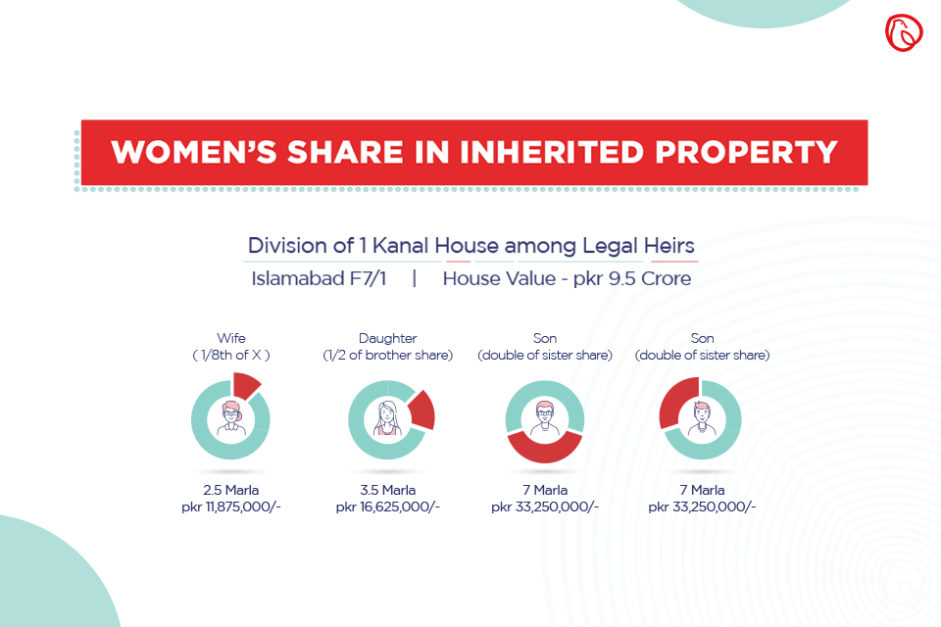Women in Pakistan have all property rights as men do. But how often and effectively do they exercise these rights, is a matter of debate. Research shows various socio-cultural barriers preventing women from getting their rightful share in the property; however, lack of awareness appears to be the root cause. In this article, we will discuss property Inheritance Rights of Women in Pakistan property law in Pakistan and under which particular laws and regulations are they being enforced.
Contents
- Rights of Inheritance
- Division of 20 Marla House under Law of Inheritance
- Division of 20 Marla House among Legal Heirs under Various Conditions
- Other situations where women can exercise property rights
- Tenancy Rights of Women

Rights of Inheritance
Islam provides rightful share to women in inheritance. The rights are protected by different applicable laws in Pakistan, including Muslim Family Laws Ordinance, 1961, Muslim Personal Law Shariat Application Act, 1962, Partition Act 1893, etc. Unfortunately, fair division of property inheritance law in Pakistan, particularly providing shares to women, has always been a problem in our society. In the past, they would be forced to surrender their property rights in favor of their male relations. And the excuse for this illegal activity would be that since women get a dowry, in addition to the considerable expense that is being borne on their marriages, they possess no legal right to claim a share in the inheritance.
However, under various case decisions, executed by superior courts of Pakistan, abandonment of rights in favor of a male heir of the deceased has been termed illegal. Under Section 498A of Prevention of Anti-Women Practices Act, 2011, “depriving women of inheriting property by deceitful or illegal means shall be punished with imprisonment which may extend to ten years but not be less than five years or with a fine of one million rupees or both.”
The following table outlines women’s property rights/share under the law of inheritance. It is important to note that the division of inherited property in Pakistan follows Shariah rules. Based on the number of legal heirs, their gender, their mutual relationship, and various other special conditions, the division of property may take several forms. However, it generally follows the following formula as a major yardstick.
‘X’ in this division of inherited property in Pakistan, the table is the total wealth of the deceased; after settling loans, mortgages and other balances the deceased owed to anyone in whatever manner.
| Individual Woman | Inheritance Right |
| Daughter |
½ of the brother’s share (in case she has brothers) 2/3rd of X equally divided among all sisters (in case she has one or more than one sisters) ½ of X (if she is the only child of her parents) |
| Mother | 1/6th of X (if the deceased had children)
1/3rd of X (if the deceased had no children and parents are the only heirs) 1/6th of X (if the deceased had brothers) |
| Wife | 1/8th of X (if she has children)
1/4th of X (if she doesn’t have any children) |
Division of 20 Marla House under Law of Inheritance
For practical understanding land law in Pakistan, let’s consider 1 Kanal (20 Marla) house in F7/1 Islamabad, which was inherited by a deceased’s wife, two sons, and a daughter. The average market value of the house is Rs.95,000, 000. We assume that the deceased had no loans or other liabilities to pay and the entire value of the house was thus to be divided among the heirs. The division takes place as follows:
As given in the table, first of all, the wife will take 2.5 Marla or Rs.11,875,000, which is, in fact, 1/8th of the total property or of its market worth. The remaining property (17.5 Marla) or its worth (83,125,000) will be divided into 5 equal parts (each son takes 02 parts and the daughter takes 01 part). With this calculation, the daughter is entitled to take either 3.5 Marla or Rs.16,625,000, which is, in fact, ½ of one brother’s share. Get to know about tax on property in Pakistan.
| Relationship with the deceased | Share in Marla | Share in Price |
| Wife – 1/8th | 2.5 Marla | Rs.11,875,000 |
| Daughter – ½ of one brother’s share | 3.5 Marla | Rs.16,625,000 |
| Sons | 7 each x 2 = 14 Marla | Rs.66,500,000 |
| Total | 20 Marla | 95,000,000 |
Division of 20 Marla House among Legal Heirs under Various Conditions
1. Deceased has a daughter as the only child
In case the deceased has a daughter as the only child, the wife gets 1/8th. The rest is divided into two equal shares. One goes to the daughter while the other to the deceased’s brothers or male cousins or other male relatives.
| Relationship with the deceased | Share in Marla | Share in Price |
| Wife – 1/8th of X | 2.5 Marla | Rs.11,875,000 |
| Daughter – ½ of the rest | 8.75 Marla | Rs.41,562,500 |
| Deceased’s brothers or cousins – ½ of rest | 8.75 Marla | Rs.41,562,500 |
2. Deceased has no children
If the deceased has no children, the value of the house is divided into four equal shares. One goes to the wife while remaining three to the deceased’s brothers or cousins.
| Relationship with the deceased | Share in Marla | Share in Price |
| Wife – 1/4th of X | 5 Marla | Rs.23,750,000 |
| Deceased’s brothers or cousins – 3/4 of X | 15 Marla | Rs.71,250,000 |
Get to know the cost to construct 5 marla, 10 marla and 1 kanal house in Pakistan.
3. Deceased has only parents as the legal heirs
If the deceased has only parents as the legal heirs, the house value will be divided into three equal shares. The mother inherits one while the father gets two shares.
| Relationship with the deceased | Share in Marla | Share in Price |
| Mother – 1/3rd | 6.6 Marla | Rs.31,666,666 |
| Father – 2/3rd | 13.4 Marla | Rs.63,333,332 |
4. Deceased has a wife, children, and parents
If the deceased has a wife, children, and parents, the wife gets 1/8th. The rest of the value is divided into six equal parts. The mother and father get one share each while the remaining four are divided among children.
| Relationship with the deceased | Share in Marla | Share in Price |
| Wife- 1/8th of X | 2.5 Marla | Rs.11,875,000 |
| Mother – 1/6th of the rest | 2.9 Marla | Rs.13,854,166 |
| Father – 1/6th of the rest | 2.9 Marla | Rs.13,854,166 |
| Children – 4/6th of the rest | 11.6 Marla | Rs.55,416,664 |
The law of inheritance is often criticized for its ‘unequal division’ among men and women. In response, it is argued that the division of inherited property is based on the financial obligations and responsibilities men and women fulfill throughout their lives in different capacities. For instance, a husband is responsible to pay the expenses of his wife and his children; even if his wife has wealth, gifts, acquired inheritance, or she earns for herself. A wife thus has been freed from all financial obligations related either to herself or her children. Additionally, a wife has a right to claim a share in all the possessions of her husband, including any inheritance he acquires.

Apart from Inheritance, there are several other situations where women’s right to exercise ownership of immovable property gets established.
Other Situations where Women can Exercise Property Rights
In addition to Inheritance, various social and cultural practices provide women a right to own a property. And if any effort is being made to deny them any of these rights, it is a clear violation of law; which can be challenged at any competent platform.
Mehr
Marriage is a social contract. Under Muslim Personal Law, in order to complete and strengthen this contract, a husband is bound to pay his proposed wife a gift, called Mehr/Dower. The quantity and form of Mehr is to be decided by both the parties. In case, a husband gives her wife 20 Marla house as a Mehr, she becomes its sole owner. She can dispose of it anywhere and anytime at her personal discretion without sharing it even with her husband.
However, for this to happen, it is necessary that the title ownership of the house is properly transferred to her name. Once transferred, the woman can exercise all legal rights to protect her property under the Property Transfer Act, 1882, Muslim Family Laws Ordinance, 1961- Section (10) and other applicable laws.
Similarly, under the Dissolution of Muslim Marriages Act, 1939, if the marriage does not survive, a wife can take along all her property that she had earned for herself. If the dissolution of marriage was demanded by wife, she would not have any right to claim Mehr. However, if it was decided by the husband, she is entitled to the Mehr.
Dowry
It is a moveable or immovable property given by the family of a woman at the time of her marriage. A woman has no enforceable legal right to demand dowry, as it is generally a social convention. However, once given to her – in this case, a 20 Marla house – she becomes its legal owner and can file a civil lawsuit against anyone who attempts to deprive her of this property. As discussed, to claim ownership of the house, she needs to have this property transferred on her name.
Will
Like men, women can execute Will in their lives. Under Sunni law, a woman can dispose of a maximum of 1/3rd of her estate without obtaining the consent of her legal heirs. The rest of it would be divided among all the legal heirs as per the law of inheritance. If the Will exceeds the limit (1/3rd), the consent of the legal heirs is necessary.
For instance, a woman executes a Will for a 20 Marla house that she leaves behind as her legacy. Technically, she can give away 1/3rd of the total property or its worth as a Will, which means either 6.66 Marla or Rs.316,666,666 in the given example; provided all loans and liabilities are already settled.
Gift
A woman can give away her entire property or any of its shares as a Gift-Hiba to anyone in her life without the consent of the legal heirs. She can also give away her property in Gifts through a Gift-Deed, by giving specific instructions that could be different from the applicable law of inheritance. Similarly, she can receive a gifted property, which can never be taken back; provided all legal formalities have been fulfilled.
So far, we discussed various situations that establish women’s rights to own and/or transfer immovable property in Pakistan. There is yet another gray area where women’s property rights are seldom admitted, though the law is very clear about it. It is the Tenancy Rights of Women.
Tenancy Rights of Women
In Pakistan, women have a legal right to occupy or possess any form of immovable property from anyone under an agreement for a specified time period. However, due to various social and cultural reasons, they fail to exercise their basic right.
Applicable laws in Pakistan, including Registration Act, 1908, The Punjab Tenancy Act 1887 among others, permit all women to acquire tenancy rights or to give tenancy rights as landowners. In the given case of 20 Marla house, if she is the sole owner, it is her legal right to carry title ownership of the house. Under the same privilege, she has all legal powers to rent out the house and become a landlord.
Similarly, if she plans to live in a rented house, she is entitled to get the rent agreement prepared and acquire tenancy rights on her name. However, different customs and social perceptions of women deny them this right and their names fail to appear on the Record of Rights. Or, if the name exists as a landowner on the Record of Rights, it is excluded from different important documents like Jamabandi Form, Shajra Nasab, etc. which adversely impact their right of ownership. Sometimes, it even deprives them of their right of inheritance, as their names do not reflect on certain documents related to Land Record.
Under the Married Women’s Property Act, 1874, a married woman is entitled to separate her share of the property and take property-related decisions in her hands. The same law provides her a right to sign contracts pertaining to her property.
Conclusion
Although religious and legal frameworks in Pakistan, property transfer law in Pakistan explain women property rights, in theory, they fail to protect them in practice. Research by public and private organizations finds that more than 80 percent of women in Pakistan fail to claim and exercise their legal property rights. Ministry of Human Rights and the Islamic Ideology Council are putting up some efforts which definitely will take some time to materialize. The govt. has established an exclusive helpline 1099 to report women property issues and get legal assistance. I am confident that such initiatives have a major role to play in alleviating issues like denying women’s property rights in Pakistan. However, getting heard will not resolve any problem, unless there is a mutually coordinated system that is supported by our social, religious and legal systems. In my opinion, the following recommendations will give an appropriate start to framing a more responsive system to protect women’s property rights in Pakistan:
- Immovable property as dower/Mehr should be transferred to the woman at the time of Nikkah.
- Inheritance and property ownership disputes should be decided in special courts.
- The courts should consistently monitor that their decisions are implemented in true letter and spirit
- Awareness campaigns should be run to educate women about their rights and existing land and property laws.
- Concessional property registration rates for women should be enforced
- Claim to inheritance rights, particularly for widows, facilitated without much procedural hassle.
We hope we’ve covered all the major property rights women can claim in Pakistan. Let us know what barriers you think women generally face in Pakistan when they attempt to exercise these rights.





In my opinion if the the conclusion is followed no women can be deprived from her property rights
This is very informative and encouraging for women in our country . The greatest barrier women face is their own unconsciousness about the rights they have . Women need to realise that they are not as powerless as society may often considers them to be . It’s time stereotypes in pakistan be broken and women step up for their rights !
Truly an eyeopener for me as I , like most people was unaware of the propety rights women can exercise in this country . Nice work 🖒🖒
Women should have defined portion of propertt from the parents in this era since women are much deprived of their rights and are left helpless after parents.
There is a strong need to educate women about their rights regarding property granted to them by religion and government.
In the male dominated society, women fear to claim their rights. The govt. should prepare a system for an automated division of inheritance.
Thank you Mr Burhan! I agree, but it surely needs to be done on priority basis.
Thank you Asifa Khan! Indeed we need to spread the word and keep spreading it unless such misconceptions die down.
Thank you Hammad Hassan! Now let’s pass the word to those who still are unaware.
Thank you Arish Naseem! As suggested, the govt. should make the division of property automated to prevent disputes.
Thank you Ammara Naseem! Yes, agreeable suggestion.
Thank you Ahmed Qureshi! Yes, I agree.
Thank you Ahmed Qureshi! Yes, I agree.
As we know that we are having patriarchal system over here in pakistan ,so its really hard for women to raise voice for their rights. The thing which can help women to have their rights is to educate them about their rights, to create awareness among them through social media platform ,seminars on women development. I personaly think that once they are educated about their rights then all the issues, regarding women rights will be resolved.
Thats a great initiative about women rights
Thank you Muhammad Qasim! I agree with you.
Thank you Sabeeh! It’ll be continued.
Salaam,
Hope you good
Actually I wanna know the widow right in her husband immovable property.
As per shia act widow has no share in her husband’s immovable property which is said by deceased brother.
I belong to Sunni family but my husband was shia, its really hard for me to raise voice for my rights.
Plz guide me what to do
Good info. Lucky me I came across your website by chance (stumbleupon).
I’ve saved it for later!
I’m still learning from you, as I’m trying to reach my goals.
I absolutely liked reading all your post. Keep it up.
I really enjoyed it!
I would like to thank you for the efforts you’ve put in writing this website.
I’m hoping to see the same high-grade blog
posts from you later on as well. In truth, your creative writing abilities has inspired me.
Such a great information for us appreciated you and your work.
We live in England but have ancestral land in Pakistan. My brothers want to take a larger share as set out in your blog. Are male heirs entitled to more even if none of us live in Pakistan? It seems very unfair.
is thier any NGO for women right ? my grantmother is effecty of inhert property right in naqshah jeem plz i need help she is ignor from comercial property
Technically women are deprived of their rights by their own family member especially brothers. Pakistan is a country where everything is on papers and nothing in reality. No one is serious about enforcing this law. The property must be divided according to the law and never to male member of the family. What a country considered to be an Islamic and follow the sunnah of Abu Jahl and Abu Lab when comes to property rights.
Documents required to claim share in parents property.
We are 9.daughters and 1 son to our parents. My father inherited some agricultural land and acquired some agricultural land. Father during his lifetime, he shared the entire property to his only son and his 2 grand childrens.RTC shows that all the land records are in the name of these 2 grandchildrens. Now my father is no more. Whether I can claim share in the property as one of the daughters. I married in Nov 1981. Further how to claim share and what documents are to be obtained to claim share. Is there any procedure to obtain documents. It is not possible to collect the same from my brother. Pls advise.
Thanks n regards
Hi. Thank you for getting in touch. For detailed information regarding the inheritance rights of women in Pakistan, please go through the blog. If you have any other questions, please let us know in the comment section below and we will get back to you as soon as possible.